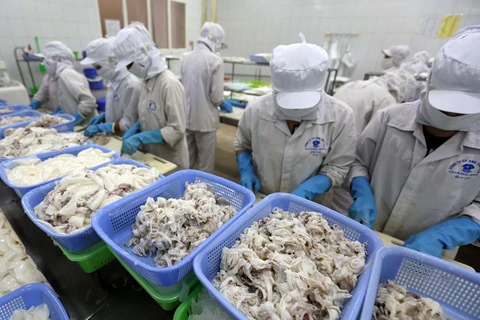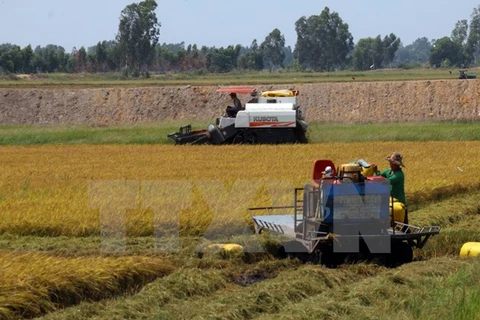Hanoi (VNA) - Vietnamese private rice exporters will be allowed to participate in the bidding for the supply contract of 250,000 tonnes of rice to Philippines on July 25.
The announcement was made by the Vietnam Food Association (VFA) while raising concerns over strict regulations for the participants.
The announcement was made by the Vietnam Food Association (VFA) while raising concerns over strict regulations for the participants.
According to the VFA, it is the first time that the Philippines’ National Food Authority (NFA) will open bidding for private suppliers from participating countries, instead of limiting the bidders to government counterparts.
In previous years, NFA’s auctions for rice were done through a government-to-government importation regime, where state-run suppliers from Vietnam, Thailand and Cambodia were invited to participate.
However, requirements for private enterprises to be invited in the bidding are quite strict and Vietnamese rice exporters do not have much experience in executing procedures for the bidding, VFA said.
Those satisfying the requirements would be allowed to bid and take full responsibility of the shipment. The Vietnamese Government’s Decree 109/2010/ND-CP on rice trading and the Ministry of Industry and Trade’s Circular 44 on guiding the implementation of the decree will not be applied in these cases.
The total volume of 25 percent broken long grain well-milled white rice is expected to arrive between August and September as requested by the NFA.
The imported volume is divided to eight lots - six lots with 25,000 tonnes each and two lots with 50,000 tonnes each.
Prospective bidders may bid for any of the lots, provided that the bid must be the minimum or maximum of the imported rice allocated per lot, but the maximum quantity to be awarded per supplier must not be higher than 50,000 tonnes.
Statistics from the Ministry of Agriculture and Rural Development revealed that Philippines was the second largest importer of Vietnamese rice in the first five months of the year with 8.6 percent of the market share.
Rice export to the market in the period reached 237,400 tonnes in volume and 90.4 million USD in value, representing a year-on-year increase of 23.4 percent and 10.4 percent, respectively.-VNA
In previous years, NFA’s auctions for rice were done through a government-to-government importation regime, where state-run suppliers from Vietnam, Thailand and Cambodia were invited to participate.
However, requirements for private enterprises to be invited in the bidding are quite strict and Vietnamese rice exporters do not have much experience in executing procedures for the bidding, VFA said.
Those satisfying the requirements would be allowed to bid and take full responsibility of the shipment. The Vietnamese Government’s Decree 109/2010/ND-CP on rice trading and the Ministry of Industry and Trade’s Circular 44 on guiding the implementation of the decree will not be applied in these cases.
The total volume of 25 percent broken long grain well-milled white rice is expected to arrive between August and September as requested by the NFA.
The imported volume is divided to eight lots - six lots with 25,000 tonnes each and two lots with 50,000 tonnes each.
Prospective bidders may bid for any of the lots, provided that the bid must be the minimum or maximum of the imported rice allocated per lot, but the maximum quantity to be awarded per supplier must not be higher than 50,000 tonnes.
Statistics from the Ministry of Agriculture and Rural Development revealed that Philippines was the second largest importer of Vietnamese rice in the first five months of the year with 8.6 percent of the market share.
Rice export to the market in the period reached 237,400 tonnes in volume and 90.4 million USD in value, representing a year-on-year increase of 23.4 percent and 10.4 percent, respectively.-VNA
VNA























